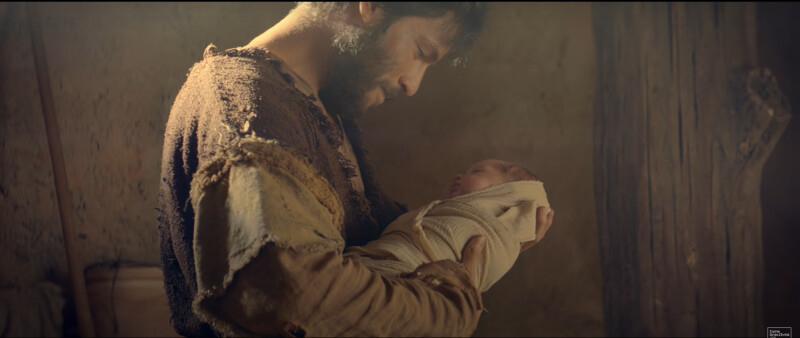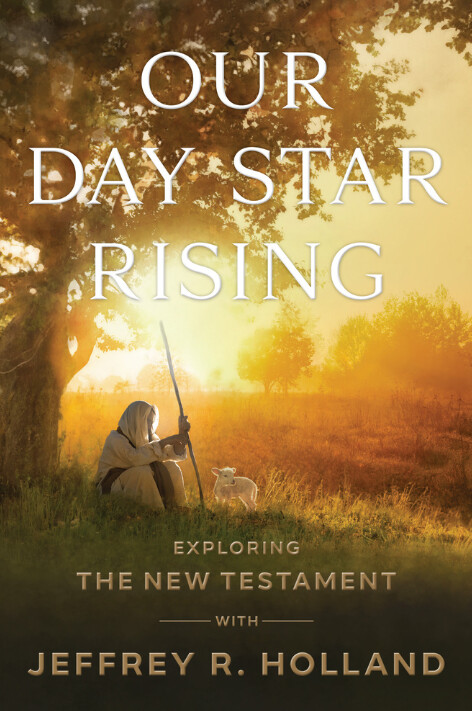As a father I have recently begun to think more often of Joseph, that strong, silent, almost unknown man who must have been more worthy than any other mortal man to be the guiding foster father of the living Son of God. It was Joseph selected from among all men who would teach Jesus to work. It was Joseph who taught Him the books of the law. It was Joseph who, in the seclusion of the shop, helped Him begin to understand who He was and ultimately what He was to become.
I was a student at Brigham Young University just finishing my first year of graduate work when our first child, a son, was born. We were very poor, though not so poor as Joseph and Mary. My wife and I were both going to school, both holding jobs, and in addition worked as head residents of an off-campus apartment complex to help defray our rent. We drove a little Volkswagen that had a half-dead battery because we could not afford a new one (Volkswagen or battery).
Nevertheless, when I realized that our own night of nights was coming, I believe I would have done any honorable thing in this world, and mortgaged any future I had, to make sure my wife had the clean sheets, the sterile utensils, the attentive nurses, and the skilled doctors who brought forth our firstborn son. If she or that child had needed special care at the Mayo Clinic, I believe I would have ransomed my very life to get it.
I compare those feelings (which I have had with each succeeding child) with what Joseph must have felt as he moved through the streets of a city not his own, with not a friend or kinsman in sight, nor anyone willing to extend a helping hand. In these very last and most painful hours of her “confinement,” Mary had ridden or walked approximately 100 miles from Nazareth in Galilee to Bethlehem in Judea. Surely Joseph must have wept at her silent courage. Now, alone and unnoticed, they had to descend from human company to a stable, a grotto full of animals, there to bring forth the Son of God.
I wonder what emotions Joseph might have had as he cleared away the dung and debris. I wonder if he felt the sting of tears as he hurriedly tried to find the cleanest straw and hold the animals back. I wonder if he wondered: “Could there be a more unhealthy, a more disease-ridden, a more despicable circumstance in which a child could be born? Is this a place fit for a King? Should the mother of the Son of God be asked to enter the valley of the shadow of death in such a foul and unfamiliar place as this? Is it wrong to wish her some comfort? Is it right He should be born here?”
But I am certain Joseph did not mutter and Mary did not wail. They knew a great deal and did the best they could. Perhaps these parents knew even then that in the beginning of His mortal life, as well as in the end, this baby son born to them would have to descend beneath every human pain and disappointment. He would do so to help those who also felt they had been born without advantage.
The Sacredness They Had Seen
Again, I have thought of Luke’s careful phrasing about that holy night in Bethlehem:
“The days were accomplished that she should be delivered.
“And she brought forth her firstborn son, and [she] wrapped him in swaddling clothes, and [she] laid him in a manger” (Luke 2:6–7; emphasis added).
Those brief pronouns trumpet in our ears that, second only to the child himself, Mary is the chiefest figure, the regal queen, mother of mothers—holding center stage in this grandest of all dramatic moments. And those same pronouns also trumpet that, save for her beloved husband, she was very much alone.
I have wondered if this young woman, something of a child herself, here bearing her first baby, might have wished her mother, or an aunt, or her sister, or a friend, to be near her through the labor. Surely the birth of such a son as this should command the aid and attention of every midwife in Judea! We all might wish that someone could have held her hand, cooled her brow, and when the ordeal was over, given her rest in crisp, cool linen.
But it was not to be so. With only Joseph’s inexperienced assistance, she herself brought forth her firstborn son, wrapped him in the little clothes she had knowingly brought on her journey, and perhaps laid him on a pillow of hay.
Then on both sides of the veil a heavenly host broke into song. “Glory to God in the highest,” they sang, “and on earth, peace among men of good will” (Luke 2:14; Phillips Translation). But except for heavenly witnesses, these three were alone: Joseph, Mary, the baby to be named Jesus.
At this focal point of all human history, a point illuminated by a new star in the heavens revealed for just such a purpose, probably no other mortal watched—none but a poor young carpenter, a beautiful virgin mother, and silent stabled animals who had not the power to utter the sacredness they had seen.
In the Arms of a Mother
The setting was as peaceful as nature could provide. The coming of night in early spring. Skies crystal clear, with stars coming out first by tens, then by hundreds, and finally by thousands. Shepherds in the field finding relief from the glare of day and the fatigue of honest labor. The only unusual—but remarkably beautiful—element in this pastoral scene was in a hillside stable close to the village, in which two human figures huddled over an infant lying in a manger with only a few domestic animals witnessing the wonder they had seen.
▶ You may also like: Elder Holland shares powerful insights into one of ‘the greatest moments in recorded faith’
These three, who had found no friend or willing host in crowded Bethlehem town, were, first: a beautiful young virgin mother named Mary (probably only in her early or mid-teens if the traditions of the day were in force), whose courage and conspicuous faith are as striking as anything ever recorded in scripture; second: her husband called Joseph, older than his young wife but one who by definition must have been the most worthy man on earth to raise a baby that was not his physical son but who would, in time, become Joseph’s spiritual father; third: last and most beautiful of all, the baby to be named Jesus, lying in swaddling clothes on the cleanest hay an anxious father could collect.
One irony this quiet, unpublicized scene belied was the fact that no baby had ever been born about whom so much was already known, of whom so much had already been written, and regarding whom so much was already expected. Indeed, knowledge about who and what He was started in the realms of heaven before anyone had been born! As Firstborn of the Father in the world of spirits, He was designated there to be the Savior of the world, foreordained to be the Lamb “slain from the foundation of the world” (Revelation 13:8). Later, but still prior to His birth, He would be the grand Jehovah of the Old Testament, helping Noah save his family in time of flood and aiding Joseph save his family in time of famine. He was the magisterial Jehovah whose names would include “Wonderful, Counselor, The Mighty God, The Everlasting Father, The Prince of Peace” (2 Nephi 19:6). He was the Alpha and Omega in the great plan of mercy who would eventually “preach good tidings unto the meek; … bind up the brokenhearted, … proclaim liberty to the captives, and [open] the prison to them that are bound” (Isaiah 61:1).
To accomplish this, He would tread the winepress of redemption utterly and entirely alone, with no mortal companion who would aid Him and no heavenly companion who could. In bearing all the sins and sorrows of mortality, He would bring the incomprehensible gift of salvation to the entire human family from Adam to the end of the world. In the full course of His journey, He would be the Shepherd and Bishop of our Souls, the Great High Priest of our Profession, the free-flowing Fountain of all Righteousness (see 1 Peter 2:25; Hebrews 3:1; Ether 8:26). All of these mortal duties and demands had yet to be met. But not tonight. Not this night. Here He was just a baby in the arms of a mother who adored Him, watched over by a father who was gentle and strong.
Our Day Star Rising
Among the many names of Christ is the Day Star—the sun—that "shineth in a dark place until the day dawn...in your hearts" (2 Peter 1:19). Our lives will have difficult periods, which may go on for days, months, or even years. But in all of it, somehow, not only when He comes again but also during the anticipation of His coming, we can rest assured that His light will guide us unfailingly through. This book reminds us of the promise that, if we wait for it and watch for it and want it badly enough, our Day Star will most certainly arise in our hearts.


